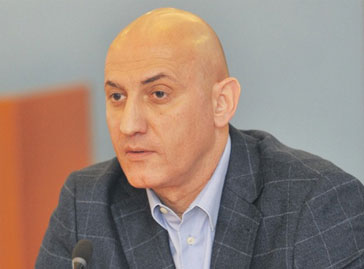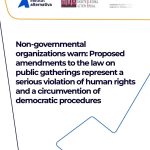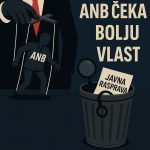13/2/2019 On the occasion of the public debate on the Draft of the Media Act
13/02/2019
4/3/2019 First instance judgment – Goran Đurović illegally dismissed of membership in the Council of Radio Television of Montenegro
05/03/201921/2/2019 On the occasion of the public debate on the Draft amendments to the Law on National Service Broadcaster Radio and Television of Montenegro (RTCG)
The NGO Human Rights Action (HRA) believes that the Draft amendments to the Law on National Service Broadcaster of the RTCG propose to seize RTCG’s independence, not in line with European standards. In the comments submitted to the Ministry of Culture, HRA supported the proposal of the experts, engaged by the Council of Europe, Eva Solomon and Tanja Kerševan Smokvina, to keep the existing law in force until a new draft is harmonised with European standards, towards which fulfilment Montenegro is striving.
HRA considers that three proposals in the Draft Law particularly jeopardise the independence of the RTCG:
- Deprivation of authority of the RTCG Council (Article 9d and 22-23) to exercise control over the implementation of the program and giving those responsibilities to the so-called “independent regulator in the field of electronic media”, which will be controlled by the Government. Namely, the members of the Council of the Agency for Electronic Media, the only regulator in the field of electronic media, as well as the Director of the Agency, will be appointed by the Government on the basis of the Law on State Administration (Article 44), adopted in November 2018. This method of appointment to the Council of the regulatory body for electronic media is not in accordance with the EU Audiovisual Media Services Directive, according to which national regulatory bodies must be legally separated from the Government and functionally independent of it or any other public or private body, nor with Recommendation Rec (2000) 23 of the Committee of Ministers of the Council of Europe to member states on the independence and functions of regulatory authorities for the broadcasting sector, which states that the law should also prescribe and in practice ensure the effective independence of regulatory authorities from political forces or economic interest;
- The election of members of the RTCG Council such that the Parliament of Montenegro votes for a specific list of candidates (Articles 38-39), instead of an individual. There is no justification for this practice, as candidates for membership are nominated independently, in their personal capacity and not on a political list, which would allow it to be voted on as a collective. In the proposed method, the RTCG Council is exposed to a serious risk that its members will not be timely selected;
- A request that the Government gives its consent, i.e. concludes the Public Service Provision RTCG (Articles 9a-9d) on the RTCG Program Plan and the budget for its financing is inconsistent with the recommendations on the editorial and financial independence of the public service from the Government (e.g. point 13 of the Recommendation 1878 (2009) of the Parliamentary Assembly of the Council of Europe – Funding of public service broadcasting).
HRA also warns of the potentially damaging intention of the draft-law’s proposers to narrow the circle of people who could contribute to the public interest of Montenegro through the national broadcaster only to those of Montenegrin citizenship (Article 25 – the election of a member of the Council, Article 48d – member of the Managing Board of the RTCG, Article 49 – the election of the Director General of the RTCG, Article 50 – the selection of the director of the RTCG and Article 53a – the election of the Ombudsman RTCG). Montenegro is a very small state. With its 622,000 inhabitants, Montenegro is 40th out of 47 member states of the Council of Europe by number of inhabitants. Each member state has one national public service – radio and television, including Russia with over one hundred forty-four million inhabitants. The government should take into consideration that a small country inevitably has a much smaller selection of experts with citizenship that can contribute to an independent and professional working of the public service and who are interested to deal with it. Accordingly, the choice of officials in the public service should not be conditional on citizenship, which in itself does not represent a guarantee of quality and commitment to the general interest of public information in accordance with international standards.
Finally, HRA believes that an amendment of the current law on RTCG is necessary, which is not proposed, and that is prescribing urgent processing of the requests for protection of the rights of a candidate for membership of the RTCG Council, or a member of the RTCG Council dismissed of function, including that final decision is made before the appointment of a member or his/her dismissal comes into force.
The experiences of Ms. Slavica Striković, who has been conducting proceedings for annulment of the decision on the election of her opponent to the RTCG Council since 2015, and Mr. Goran Djurović, who has been conducting proceedings for annulment of the decision on his illegal dismissal from the function of RTCG Council member since January 2018, show that Montenegro has no effective remedy against the illegal decision-making of the majority in the Parliament of Montenegro on the election and dismissal of members of the Council, which Goran Djurović also claims, among other things, before the European Court of Human Rights, in the proceedings where he is represented by HRA and the Media Legal Defense Initiative from London.







 English
English